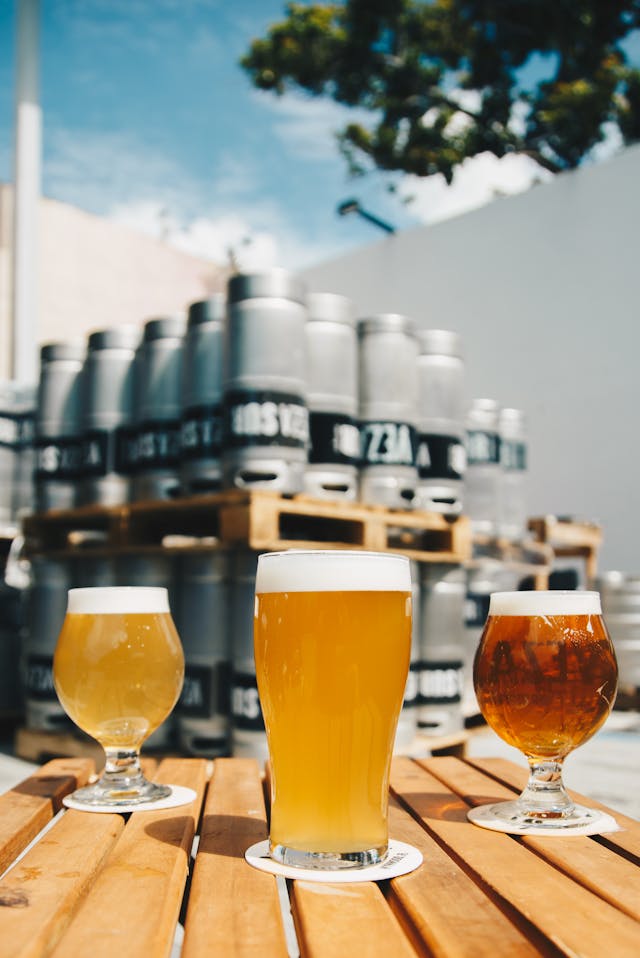
Beer Kegs – an environmentally friendly way to purchase beer
Beer is one of the most popular beverages in the world, and how it’s packaged makes a big difference—not just in taste and cost, but in environmental impact. While beer cans are convenient and widely available, choosing to buy beer by the keg offers a much more sustainable and eco-friendly option. Whether you’re hosting a party, stocking up for a gathering, or just enjoy your beer on tap, here’s why opting for a keg over a case of cans is a greener choice.
1. Dramatically Reduces Packaging Waste
A standard 15.5-gallon keg holds the equivalent of about 165 12-ounce cans of beer. That’s 165 aluminum cans that don’t need to be produced, used, and (hopefully) recycled—or worse, thrown away. While aluminum is recyclable, the recycling process still consumes energy, and not all cans actually make it into the recycling stream. Kegs, on the other hand, are reused hundreds of times over their lifespan, making them one of the most efficient beverage containers on the market.
2. Lowers Carbon Emissions from Production and Shipping
Aluminum can production is energy-intensive. The mining, smelting, and manufacturing involved in producing cans emits significant amounts of carbon dioxide. When you buy beer in kegs, you bypass the need for that much packaging altogether. Additionally, transporting a single keg is far more space- and energy-efficient than moving the equivalent number of cans. That means fewer delivery trips and lower fuel consumption—a big win for reducing greenhouse gas emissions.
3. Minimizes Single-Use Plastics
Canned beer often comes shrink-wrapped or packaged with plastic rings—both of which contribute to the growing problem of plastic pollution. These materials are rarely recycled and often end up in oceans and waterways where they harm wildlife. Keg systems eliminate the need for this kind of secondary packaging, cutting out unnecessary plastic entirely.
4. Promotes a Circular Economy
Most kegs are made of stainless steel and are part of a deposit-return system, meaning they’re cleaned, sanitized, and reused by breweries many times over. This closed-loop system is a perfect example of a circular economy, where materials are kept in use for as long as possible, reducing the need for virgin resources and minimizing waste.
5. Reduces Beer Waste
When properly stored and served, kegs keep beer fresher longer thanks to airtight seals and pressurized systems. This reduces spoilage and waste, which not only benefits your wallet but also lowers the environmental cost of brewing and distributing that beer in the first place.
6. Encourages Conscious Consumption
Buying a keg usually requires a bit more planning than grabbing a six-pack, which can encourage more mindful, less impulsive consumption. This shift in behavior often leads to more efficient use of resources overall—especially at events where many people are drinking from the same supply, reducing the overall packaging footprint.
Final Thoughts
From slashing packaging waste and carbon emissions to supporting reusable systems, buying a keg of beer is an environmentally smarter choice than stocking up on cans. It’s a simple switch that not only makes parties more sustainable but also supports the kind of waste reduction and resource conservation that our planet desperately needs.
So the next time you’re planning a gathering—or just stocking your personal beer supply—consider going with the keg. The Earth (and your recycling bin) will thank you.
Comparing Keg Sizes & Types
| Capacity (gal /oz) | Weight (lbs) | Cans/Bottles (12 oz) | Returnable | |
|---|---|---|---|---|
| Half Barrel Keg | 15.5 / 1984 | 160 | 165 | yes |
| Quarter Barrel | 7.75 / 992 | 87 | 82 | yes |
| Sixth Barrel Keg | 5.16 / 661 | 58 | 56 | yes |
| Mini Keg | 1.32 / 169 | 13 | 13 | no |